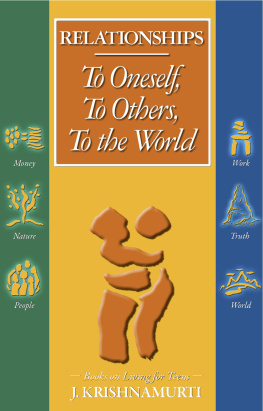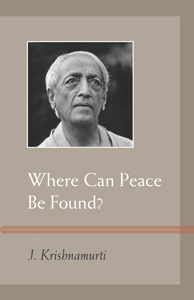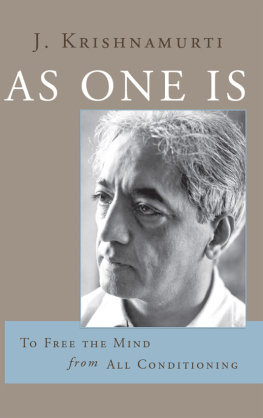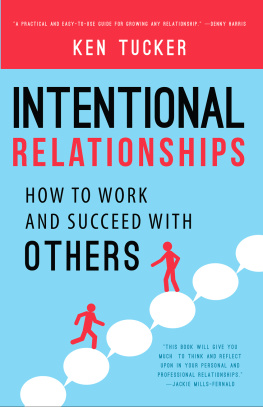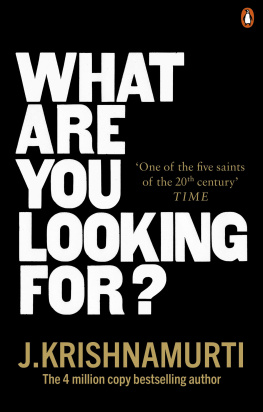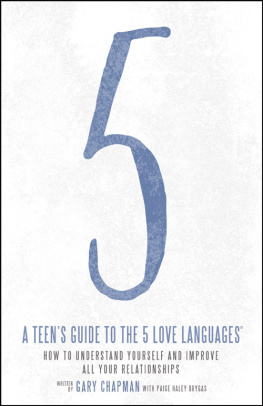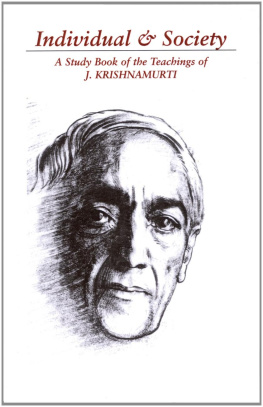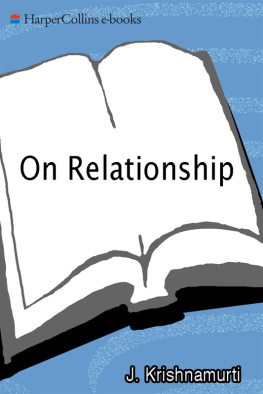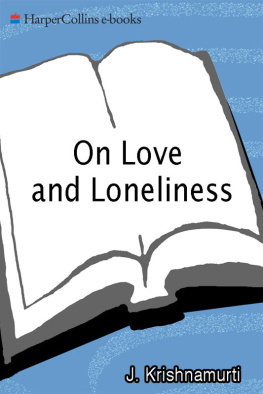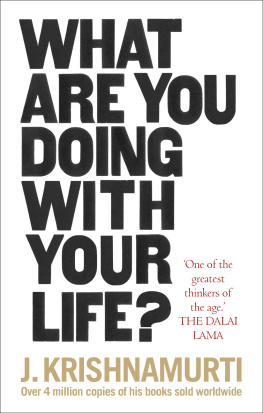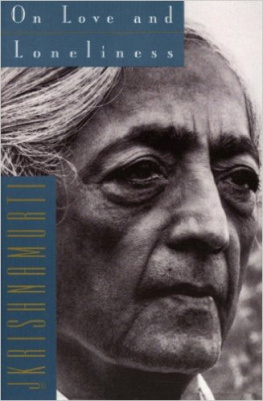Krishnamurti - Relationships: To Oneself, To Others, To the World
Here you can read online Krishnamurti - Relationships: To Oneself, To Others, To the World full text of the book (entire story) in english for free. Download pdf and epub, get meaning, cover and reviews about this ebook. year: 2010;2001, publisher: Krishnamurti Foundation, genre: Religion. Description of the work, (preface) as well as reviews are available. Best literature library LitArk.com created for fans of good reading and offers a wide selection of genres:
Romance novel
Science fiction
Adventure
Detective
Science
History
Home and family
Prose
Art
Politics
Computer
Non-fiction
Religion
Business
Children
Humor
Choose a favorite category and find really read worthwhile books. Enjoy immersion in the world of imagination, feel the emotions of the characters or learn something new for yourself, make an fascinating discovery.
- Book:Relationships: To Oneself, To Others, To the World
- Author:
- Publisher:Krishnamurti Foundation
- Genre:
- Year:2010;2001
- Rating:3 / 5
- Favourites:Add to favourites
- Your mark:
- 60
- 1
- 2
- 3
- 4
- 5
Relationships: To Oneself, To Others, To the World: summary, description and annotation
We offer to read an annotation, description, summary or preface (depends on what the author of the book "Relationships: To Oneself, To Others, To the World" wrote himself). If you haven't found the necessary information about the book — write in the comments, we will try to find it.
Relationships: To Oneself, To Others, To the World — read online for free the complete book (whole text) full work
Below is the text of the book, divided by pages. System saving the place of the last page read, allows you to conveniently read the book "Relationships: To Oneself, To Others, To the World" online for free, without having to search again every time where you left off. Put a bookmark, and you can go to the page where you finished reading at any time.
Font size:
Interval:
Bookmark:

~
Love, Sex, and Relationship
We Have Two Problems
So we have two problems love and sex. The one is an abstract idea, the other is an actual daily biological urge a fact that exists and cannot be denied. Let us first find out what love is, not as an abstract idea, but what it actually is. What is it? Is it merely a sensuous delight, cultivated by thought as pleasure, the remembrance of an experience which has given great delight or sexual enjoyment?.Does it exist without the object? Or does it come into being only because of the object?.Or is love a state in you?
What Is Love?
What is love? Can we understand it verbally and intellectually, or is it something that cannot be put into words? What is it that each one of us calls love? Is love sentiment? Is love emotion? Can love be divided as divine and human? Is there love when there is jealousy or hatred or competitive drive? Is there love when each one of us is seeking his own security, both psychological as well as worldly, outwardly? Don't agree or disagree, because you are caught in this. We are not talking of some love that is abstract; an abstract idea of love has no value at all. You and I can have a lot of theories about it, but actually, what is the thing that we call love?
There is pleasure, sexual pleasure, in which there is jealousy, the possessive factor, the dominating factor, the desire to possess, to hold, to control, to interfere with what another thinks. Knowing all the complexity of this, we say that there must be love that is divine, that is beautiful, untouched, uncorrupted; we meditate about it and get into a devotional, sentimental, emotional attitude, and are lost. Because we can't fathom this human thing called love we run away into abstractions that have absolutely no validity at all. Right? So what is love? Is it pleasure and desire? Is it love of the one and not of the many?
To understand this question what is love? one must go into the problem of pleasure, sexual pleasure, or the pleasure of dominating another, of controlling or suppressing another; and whether love is of the one, denying the love of the other. If one says, "I love you," does it exclude the other? Is love personal or impersonal? We think that if one loves one person, one can't love the whole, and if one loves mankind then one can't possibly love the particular. This all indicates, does it not, that we have ideas about what love should be? This is again the pattern, the code developed by the culture in which we live, or the pattern that one has cultivated for oneself. So for us, ideas about love matter much more than the fact; we have ideas of what love is, what it should be, what it is not. The religious saints, unfortunately for mankind, have established that to love a woman is something totally wrong; you cannot possibly come near their idea of God if you love someone. That is, sex is taboo; it is pushed aside by the saints, but they are eaten up with it, generally. So to go into this question of what love is, one must first put away all ideas, all ideologies of what it is, or should be, or should not be, and the division as the divine and the not divine. Can we do that?
What Love Is Not
Questioner: What do you mean by love?
Krishnamurti: We are going to discover by understanding what love is not, because, as love is the unknown, we must come to it by discarding the known. The unknown cannot be discovered by a mind that is full of the known
What is love with most of us ? When we say we love somebody, what do we mean? We mean we possess that person. From that possession arises jealousy, because if I lose him or her what happens? I feel empty, lost; therefore I legalize possession; I hold him or her. From holding, possessing that person, there is jealousy, there is fear, and all the innumerable Conflicts that arise from possession. Surely such possession is not love, is it ?
Obviously love is not sentiment. To be sentimental, to be emotional, is not love, because sentimentality and emotion are mere sensations. A religious person who weeps about Jesus or Krishna, about his guru or somebody else, is merely sentimental, emotional. He is indulging in sensation, which is a process of thought, and thought is not love. Thought is the result of sensation, so the person who is sentimental, who is emotional, cannot possibly know love. Again, aren't we emotional and sentimental? Sentimentality, emotionalism, is merely a form of self-expansion. To be full of emotion is obviously not love, because a sentimental person can be cruel when his sentiments are not responded to, when his feelings have no outlet. An emotional person can be stirred to hatred, to war, to butchery. A man who is sentimental, full of tears for his religion, surely has no love.
Is forgiveness love ? What is implied in forgiveness ? You insult me and I resent it, remember it; then, either through compulsion or through repentance, I say, "I forgive you." First I retain and then I reject. Which means what? I am still the central figure. I am still important, it is I who am forgiving somebody. As long as there is the attitude of forgiving it is I who am important, not the man who is supposed to have insulted me. So when I accumulate resentment and then deny that resentment, which you call forgiveness, it is not love. A man who loves obviously has no enmity and to all these things he is indifferent. Sympathy, forgiveness, the relationship of possessiveness, jealousy, and fear all these things are not love. They are all of the mind, are they not? The mind can only corrupt love, it cannot give birth to love, it cannot give beauty. You can write a poem about love, but that is not love.
Obviously there is no love when there is no real respect, when you don't respect another, whether he is your servant or your friend. Have you not noticed that you are not respectful, kindly, generous, to your servants, to people who are so-called "below" you ? You have respect for those above, for your boss, for the millionaire, for the man with a large house and a title, for the man who can give you a better position, a better job, from whom you can get something. But you kick those below you
You can know love only when all these things have stopped, come to an end.How few of us are generous, forgiving, merciful! You are generous when it pays you, you are merciful when you can see something in return. When these things disappear, when these things don't occupy your mind and when the things of the mind don't fill your heart, then there is love; and love alone can transform the present madness and insanity in the world not systems, not theories
The practice of love, the practice of brotherhood, is still within the field of the mind, therefore it is not love. When all this has stopped, then love comes into being, then you will know what it is to love. Then love is not quantitative but qualitative. You do not say, "I love the whole world," but when you know how to love one, you know how to love the whole. Because we do not know how to love one, our love of humanity is fictitious. When you love, there is neither one nor many: there is only love. It is only when there is love that all our problems can be solved.
Why Have We Made Sex a Problem?
Questioner: We know sex as an inescapable physical and psychological necessity and it seems to be a root-cause of chaos in the personal life of our generation. How can we deal with this problem?
Krishnamurti: Why is it that whatever we touch we turn into a problem? We have made God a problem, we have made love a problem, we have made relationship, living a problem, and we have made sex a problem. Why? Why is everything we do a problem, a horror? Why are we suffering? Why has sex become a problem? Why do we submit to living with problems, why do we not put an end to them? Why do we not die to our problems instead of carrying them day after day, year after year? Sex is certainly a relevant question but there is the primary question: why do we make life into a problem? Working, sex, earning money, thinking, feeling, experiencing you know, the whole business of living why is it a problem? Is it not essentially because we always think from a particular point of view, from a fixed point of view?
Font size:
Interval:
Bookmark:
Similar books «Relationships: To Oneself, To Others, To the World»
Look at similar books to Relationships: To Oneself, To Others, To the World. We have selected literature similar in name and meaning in the hope of providing readers with more options to find new, interesting, not yet read works.
Discussion, reviews of the book Relationships: To Oneself, To Others, To the World and just readers' own opinions. Leave your comments, write what you think about the work, its meaning or the main characters. Specify what exactly you liked and what you didn't like, and why you think so.

